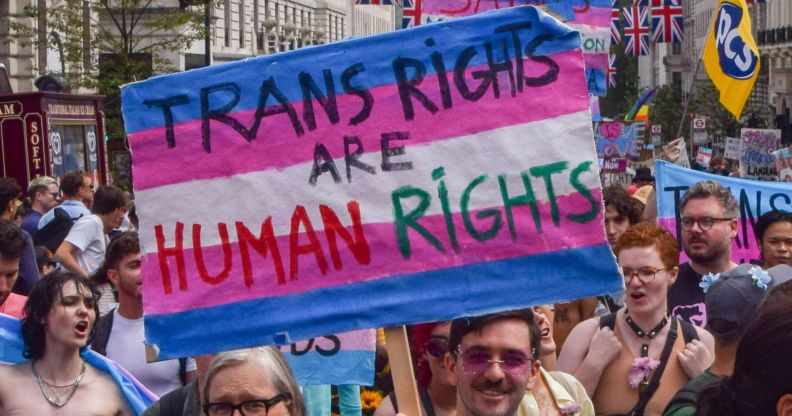Court of Appeal dismisses legal challenge to years of NHS waits faced by trans people

Data showed that trans young people are waiting up to three years for a consultation appointment. (Getty)
The Court of Appeals has dismissed a case challenging the years-long NHS wait times for transgender healthcare.
A judgement handed down on Monday (31 July) upheld a decision that a policy for NHS England’s (NHSE) duty to refer 92 per cent of patients on a waiting list to specialist clinics within 18 weeks was not enforceable and only a “target duty.”
Justices wrote that they believed the commitment was only applicable to “consultant-led services” and is, as a result, not legally binding as the claimants had argued.
“For these reasons, I would uphold the Judge’s conclusion on the duty and dismiss the appeal,” Chamberlain continued.
The Good Law Project, which worked in part with several trans activists and organisations, wrote that it was “disappointed” that the appeal had been dismissed.
Legal officer at Good Law Project, Bekah Sparrow, said in a statement that the outcome was “not what we hoped for,” adding that the nonprofit group was disappointed to see “NHS patients let down once again.”
“Good Law Project wants to see a world in which everyone, regardless of their gender identity, is able to access the healthcare they need within reasonable timeframes.
“We continue to stand alongside the transgender community, and all NHS patients, as we work towards a fairer world.”
‘NHS England have specific duty to minimise wait times’
The original case was brought by several advocacy groups, including Good Law Project, in October 2021 with claimants arguing that NHSE’s stance on trans healthcare had increasingly followed “political rhetoric” rather than what it called “treatment realities.”
Data collected from 2022 suggests that 90 per cent of the 26,234 adults waiting for a first appointment for gender-affirming care had been waiting over 18 weeks, while young people are waiting an average of three years.
In January 2023, the High Court rejected the case challenging the long waiting times, with Justice Chamberlain writing that he believed NHS England to be “doing all it can reasonably be expected to do to reduce waiting times.”
In response, trans activist and one of the claimants, Eva Echo, said she was “extremely disappointed” by the decisions, arguing that it will only serve to “prolong the mental health suffering of the trans community.”
Chamberlain later gave permission to appeal after suggesting there was a “real prospect” of the Court of Appeal differing from his own reasoning.
“This is of great enough general importance to be considered by the Court of Appeal,” he continued.
During a hearing for the appeal, Good Law Project legal representatives argued that the NHS constitution has a “specific duty” to honour commitments to NHS patients.
It also argued that the claim NHSE provisions were strained by the COVID-19 pandemic are unfounded because “such an issue was anticipated as far back as 2010.”
“We can’t hide from [the impact of COVID-19] even though the statistics show that even before COVID, NHS England was in breach of its duty.
“An influenza epidemic was anticipated, and it was anticipated that if that occurred, it may be the case that the obligations in question were required to be suspended.”
Good Law Project thanked those who had “chipped in” to help fund legal proceedings for the case, adding the support proved “how many of us agree that everyone should be able to access the healthcare they need.”
How did this story make you feel?

